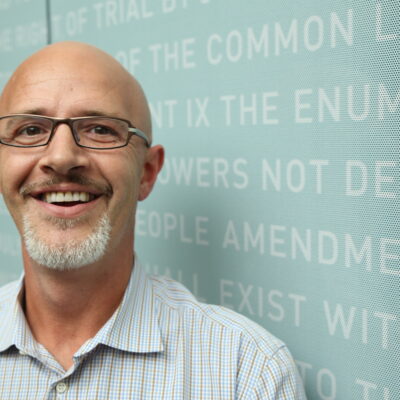Back then, it was part of my regular school day to be called anti-gay slurs, to be pushed into lockers, and to have my books knocked out of my hands—apparently I carried them in a feminine way. I couldn’t wait to graduate so I could escape the constant fear I faced each time I boarded the school bus, or walked down the halls, out onto the playground, or into the cafeteria. Thankfully, I finished high school, went to college and law school, and ended up landing a dream job at the ACLU of Southern California.
Now I direct an
anti-bullying project with the mission of stopping unlawful harassment and bullying in California schools and creating school communities that promote safety and respect for all students. Our project teaches school personnel about the rights of lesbian, gay, bisexual, and transgender (“LGBT”) students, and holds accountable those who allow anti-gay discrimination to go unchecked. Admittedly, the project’s goals are lofty, but they are made more attainable by the strong anti-bullying laws we have in California, including explicit protections for LGBT students.
If only LGBT students in Tennessee were as fortunate.
Ninety-eight percent of the LGBT students in Tennessee report verbal harassment . Yet no laws exist in Tennessee specifically protecting LGBT students. That leaves students like Jacob Rogers to defend themselves when their teachers won’t step in to stop the bullying—or worse, when their teachers choose to bully them directly. Imagine how difficult that can be for a confused teenager, many of whom cannot rely on family for support.
Compounding the struggle our youth face, many teenagers who are questioning their sexual orientation and/or gender identity often feel isolated and alone. I was often reminded of this during the time I served as the executive director of
Mid-TN Nashville Pride ; after each year’s parade—which always made the local news and the cover of the Tennessean—I’d get at least one call from a local student, expressing thanks to the Pride organization for planning an event that proved LGBT people live in Tennessee too.
Through all of these experiences—from being bullied, to highlighting the rich diversity of Middle Tennessee’s LGBT community, to ensuring that the bullying stops here—I have learned that preventing future tragedies like what befell Jacob will require a community-wide conversation and response. It will require advocacy to ensure passage of strong local school board policies and statewide laws to protect LGBT students; it will require engaging the community to teach LGBT students about their rights, and to teach school personnel about their obligations to uphold those rights. And, in some instances, it may require litigation to force school districts to comply with the law. But together, we can stop bullying. I hope you will join us in this effort.
James W. Gilliam is the deputy executive director of the ACLU of Southern California and the director of the organization’s anti-bullying project. He served as executive director of Mid-TN Nashville Pride until 1999 when he moved to Los Angeles for law school.

